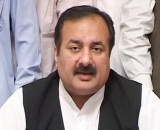IMF bailout package may not be bad deal for Pakistan, say experts
Suggest govt should introduce fiscal responsibility, rely on direct taxation .

"The major problem with IMF loans is that there is no particular ownership for the loans among the political class," SDPI Executive Director Dr Abid Suleri. PHOTO: FILE
These thoughts were expressed by experts at a seminar titled “Pakistan Federal Budget 2013-14 and Role of IMF”, organised by the Sustainable Development Policy Institute (SDPI) on Monday.
The IMF has indicated a loan package worth $5.3 billion for Pakistan, subject to approval from the Washington-based fund’s executive board in September, which will be payable over ten years. Pakistan had applied for a $7 billion for balance of payment support.
Speakers at the seminar said that perhaps IMF was not coming to Pakistan to dictate policies, but to point out the difference in expenditure and revenues. They said Pakistan has a 48% mismatch in expenditures and revenues according to the Federal Budget 2013-14.

Farrukh Pitafi, an analyst and columnist, said the previous government had also negotiated with the IMF to improve the balance of payment situation. He said the promise of financial reform failed to materialise then because of a coalition government that could not develop consensus on the issue. Pakistan had abandoned a previous $11.3 billion loan programme in 2011, according to a previous report by The Express Tribune.
The speakers agreed that Pakistan should be happy someone is helping out the country in tough economic times.
“If the IMF loan agreement can help the country widen its tax-to-gross domestic product (GDP) base and overcome the energy crisis, then to me it is not a bad deal,” said Dr Abid Suleri, executive director of the SDPI.
But Suleri said unless the country wants to head towards another IMF fund facility in the future, we must practice fiscal discipline and cut down on indirect taxes, which punish the poor.
“The government needs to give a roadmap to reduce indirect taxation,” he said.
Suleri said the Federal Board of Revenue (FBR) does not go for direct taxation, because indirect taxation is an easy source of revenue for them.
Speakers said Pakistan Muslim League-Nawaz (PML-N) government decided to continue the Benazir Income Support Programme not because of some political generosity, but because IMF does not allow reduction in social safety related programmes as a policy.
Safiya Aftab, an economic expert and financial consultant, said the number of Pakistanis who file direct tax returns – a dismal 1.2 million Pakistanis file direct taxes and it is not certain how many of these actually pay taxes – has remained roughly stable over the past 10 years. Aftab said an optimistic assessment would be that this number can be doubled in the next five years through governmental effort, especially if the undocumented economy is brought under the government’s radar.
Responding to a question during the discussion, she said the government should not tinker with the allocation for provinces in the National Finance Commission award but put some conditionality in the award for provinces to generate their own revenue streams.
Suleri said the major problem with IMF loans is that there is no particular ownership for the loans among the political class. One government blames the loans taken by the previous governments creating a vicious cycle, he said.
The speakers said there is no solution in the short or medium term for cheaper electricity, and therefore the circular debt situation is going to persist. They urged the government to focus on improving governance and subsidising alternative energy solutions to cope with the power crisis.
Published in The Express Tribune, July 23rd, 2013.
Like Business on Facebook, follow @TribuneBiz on Twitter to stay informed and join in the conversation.



















COMMENTS
Comments are moderated and generally will be posted if they are on-topic and not abusive.
For more information, please see our Comments FAQ